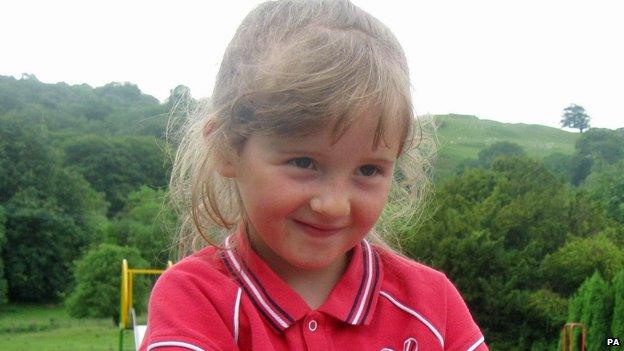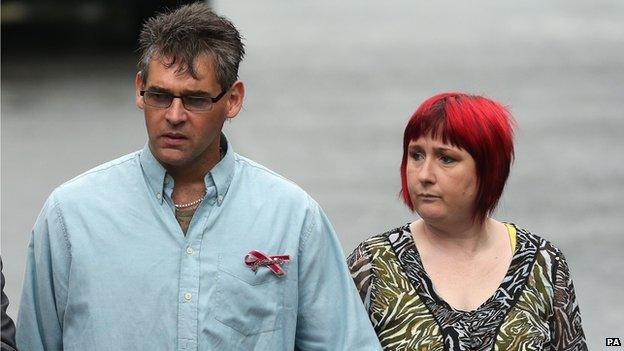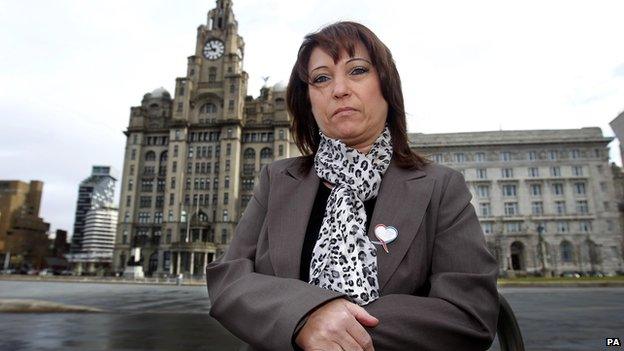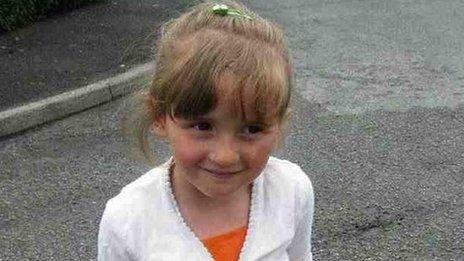The hardest form of grief
- Published

The parents of murdered five-year-old April Jones have written a book about her disappearance. They say this has helped them cope with their grief, but how can anyone deal with such emotion, ask Phil Williams and Justin Parkinson.
It's almost two-and-a-half years since April Jones went missing while playing outside her family home in Machynlleth, mid-Wales. Despite the biggest police search in British history, the five-year-old's body was never found. Mark Bridger, who had a collection of child abuse images on his computer, was found guilty of her murder.
When April went missing, her father Paul's reaction was to go on walks to escape a house filled with police, family and friends. "I found I was close to April, sitting on top of the hill looking down on the situation," he tells BBC Wales's Week In Week Out, "and I found I talked to her a little bit and it just eased the pressure for me."
Paul's wife Coral felt differently. "I just couldn't go out. I couldn't meet people," she says. "I didn't want to know anybody so I stayed most of my life [at home]. I still do some days now."
After April went missing, a police family liaison officer advised Paul to keep a diary of his thoughts. This forms part of a book, called April, by the Joneses, which is being published this month.

Paul and Coral Jones, pictured outside Mold Crown Court in May 2013
Some other parents of murdered children have done the same. Kevin Wells, father of Holly Wells, who with Jessica Chapman was killed by school caretaker Ian Huntley in 2002, wrote an account of what it was like to live through the disappearance, investigation and trial.
In the 1980s, Ann West, mother of Lesley Ann Downey, one of the victims of Moors murderers Ian Brady and Myra Hindley, wrote a book recalling her ordeal in the 1960s. This included identifying the body and having to listen to recordings of her daughter pleading with Brady and Hindley to stop.
"Writing things down doesn't work for everyone, but it can be therapeutic," says Sandi Mann, senior psychology lecturer at the University of Central Lancashire. "You use the words as a record, helping you to chart your progress.
"Some people will want to keep what's written down to themselves, while others will want to talk in public or write books about their experience because they find it therapeutic. They will also want to keep the memory of their child alive."

Take your time, when you feel ready talk to family, close friends or support groups.
Get information about bereavement from books or support organisations.
Try not to isolate yourself from others and try to find a way of telling others what you need.
Don't feel pressurised into grieving in a particular way - we all do it differently.
Source: Child Bereavement UK, external

Child killings are rare. There were 67 victims of murder or manslaughter, external under the age of 16 in England and Wales in 2012-13. Of these, eight were killed by "a stranger", according to the Office for National Statistics. In Scotland, there were two victims under the age of 18, while none were recorded in Northern Ireland.
Partly because of the rarity of these crimes, parents can find themselves under the media spotlight. The cases can stay in the public mind for years. The names of James Bulger, Sarah Payne and Milly Dowler are arguably as well known as when they were first reported between 13 and 22 years ago.
Studies show that bereaved parents grieve differently, external, some indefinitely. Among the emotions experienced can be guilt at having been unable to protect their child.
Just after the death, the fact that a criminal investigation is going on can make the situation more complex, with police liaison officers, whose primary objective is to help the inquiry, external, and others looking for evidence.
The father of April Jones has urged people who feel they may abuse children to seek help for their feelings first
"There is no fixed formula and no predictable timescale" for grieving, says Katie Koehler from Child Bereavement UK, external. "How an individual responds will depend on their developmental age and understanding, their prior experience of death and how those around them are responding in addition to the circumstances of the death."
Following April's murder, the Joneses have campaigned for child abuse images to be taken off the internet. They have met Sara Payne, whose eight-year-old daughter Sarah was killed by paedophile Roy Whiting in West Sussex in 2000. It emerged that Whiting had already been on the sex offenders' register for attacking another eight-year-old.
Sara began a campaign for "Sarah's Law", allowing concerned parents or grandparents to contact police to find out if an adult who has contact with a child has a history of sexual offences. The rule came into effect in England and Wales, external in 2011.
Several other parents of murdered children have set up projects in their name. Denise Fergus, the mother of James Bulger, the two-year-old abducted and murdered by two older boys in Liverpool in 1993, set up the James Bulger Memorial Trust, external in 2011. It provides holidays and other rewards to young people who have suffered bereavement or been the victims of crime, hatred or bullying, and their families. It makes the same offer to those who have shown "exemplary conduct" or made "a positive contribution" to others' lives.
"I know how much hurt and pain is caused through losing a child," says Denise, "and after a very dark time in my life I decided to try to do some good in my son's name." She adds that her aim is to "help other families and their children who have or are going through a tragic time in their lives".

Denise Fergus set up the James Bulger Memorial Trust in memory of her son
The 25-year-old London estate agent Suzy Lamplugh disappeared while apparently out at a viewing in 1986. No trace ever having been found, she was declared dead in 1993.
Her parents set up the Suzy Lamplugh Trust, external a few months after her disappearance. It still provides advice and training on personal safety and how to deal with aggression and stalking. "One of the things I feel deeply is that if Suzy has died, or whatever terrible thing has happened, I don't want everything to be totally negative," Suzy's mother Diana, who died in 2011, once said.
Doreen Lawrence, mother of Stephen Lawrence, who was killed in a racially motivated attack in 1993, aged 18, started the Stephen Lawrence Charitable Trust, external. It provides bursaries for aspiring architects and seeks to influence the justice system.
"One way a lot of people seem to try to cope is to look for something good to come out of the situation," says Sandi Mann. "They try to make a situation better or to prevent what happened to them from happening again. It's a sort of balancing of the trauma. It allows people to move forward, but not to forget."
In the US, the Murder Victims' Families for Reconciliation, external group campaigns for the abolition of the death penalty. Bereaved parents are among those involved.
A 2008 study at Georgia State University, external found parents tended to recover better when they had a sense of "life purpose", adding that this was "unrelated" to the amount of time that had lapsed since the death.
But studies also suggest that parents who lose a child are more likely to suffer poor health, depression and marital break-ups, external.
Last October, Michael Payne, father of Sarah Payne, was found dead at his home, external in Maidstone, Kent. The 45-year-old had struggled with depression and alcoholism since his daughter's death and had separated from wife Sara in 2003.
In 2011 he had been jailed after admitting hitting his brother with a glass after heavy drinking. "The assorted aftermath had a life-changing effect on him and his then wife and his family," his lawyer said in court. "It's desperately sad."
Life after April: Week in Week out will be shown on BBC One Wales at 21:00 BST on Thursday 9 April.
Subscribe to the BBC News Magazine's email newsletter to get articles sent to your inbox.
- Published9 April 2015
